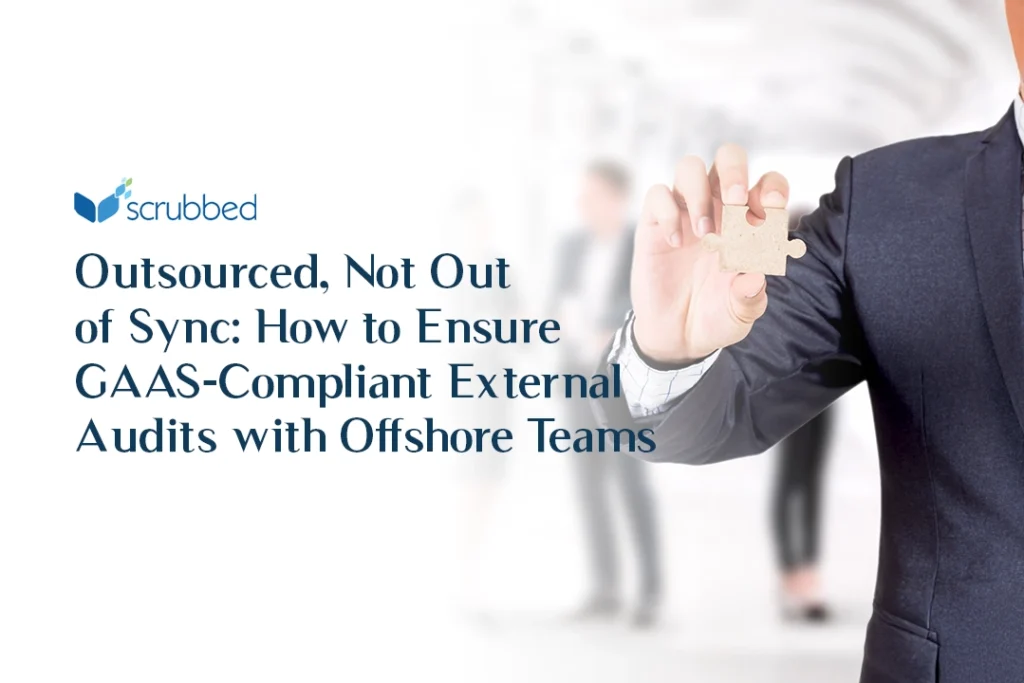Outsourcing has evolved from a cost-cutting tactic to a strategic lifeline for CPA firms facing mounting deadlines, heightened client expectations, and staffing shortages. Offshore teams play a vital role in helping firms expand capacity and deliver on time during peak seasons.
Still, one question often lingers: Can offshore professionals truly uphold U.S. audit standards? For external audits governed by frameworks like Generally Accepted Auditing Standards (GAAS), the Public Company Accounting Oversight Board (PCAOB) standards, or the Government Accountability Office’s Yellow Book (GAGAS), compliance is non-negotiable.
The answer is yes. With the right training, oversight, and collaboration, offshore teams can deliver GAAS-compliant audits that meet the same level of quality as work performed stateside, while helping firms stay competitive in today’s challenging environment.
A Common Misconception About Outsourcing
For years, one of the biggest objections to outsourcing has been the fear that it erodes audit quality. But that belief is quickly becoming outdated. In fact, PCAOB research shows the opposite: when done right, offshore support can actually lower costs and improve efficiency without compromising compliance or quality.
Firms that integrate offshore teams into their audit model aren’t just saving money; they’re also gaining scalability, improving staff retention, and boosting realization rates. In many cases, the additional review layers and standardized processes that come with offshore work can enhance audit quality rather than diminish it.
And at a time when the profession is under immense pressure, this matters more than ever. Since 2019, the number of accountants in the U.S. has dropped by nearly 10%, driven by retirements and fewer new entrants to the field. Yet demand isn’t easing. The Bureau of Labor Statistics projects jobs for accountants and auditors will grow 5% between 2024 and 2034, outpacing many other occupations.
It’s no surprise, then, that more firms are turning to offshore solutions to meet demands. Roughly one in four CPA firms are already leveraging offshore support, and another 12% are planning to follow suit. Even the Big Four now rely heavily on offshore Shared Service Centers, which have become nearly universal and, according to PCAOB research, have reduced audit hours and fees without diminishing quality.
How to Ensure GAAS-Compliant External Audits
Outsourcing can only succeed if audit quality remains intact. U.S. firms need confidence that offshore teams will deliver work consistent with GAAS, PCAOB, and Yellow Book requirements. That level of trust comes from three things: specialized training, rigorous review protocols, and seamless integration into the firm’s existing workflow.
Training and Quality Controls
The process starts with preparation. Many offshore professionals already hold CPA or Chartered Accountant credentials, but what sets them apart is the additional training they receive on GAAS, PCAOB, and Yellow Book standards. Ongoing education ensures they’re not only qualified but also current with updates from the AICPA and PCAOB, so their work reflects the latest guidance.
That foundation is reinforced by strong quality controls. Workpapers follow U.S. documentation norms, with consistent tick marks, indexing, and cross-referencing. Deliverables such as audit memos, reconciliations, and testing templates move through several layers of review before reaching U.S. managers. By the time they’re added to the engagement file, they’re polished, consistent, and ready for inspection.
Seamless Collaborations
Technical skills alone aren’t enough. What makes offshore support successful is the way teams work together. Offshore professionals join kickoff calls, stay active in weekly updates, and follow clear escalation protocols when issues arise. This steady communication ensures they’re aligned with U.S. audit leads at every stage of the engagement.
Even the time zone difference, often seen as an obstacle, can become a practical advantage. While U.S. teams wrap up their day, offshore professionals continue with testing and documentation. That creates near-round-the-clock momentum, keeping audits on schedule without sacrificing quality.
Finally, technology brings it all together. Because offshore staff are trained in platforms like CaseWare, CCH ProSystem fx Engagement, Checkpoint, and Thomson Reuters Engagement Manager, they work directly in the same systems as U.S. auditors.
Moreover, secure file-sharing tools like Suralink and ShareFile further enhance data protection by encrypting client documents and ensuring confidentiality, which are key to maintaining professional trust. The result is seamless integration, reduced handoffs, and consistent, high-quality engagement files across teams.
Empower Firms With Scrubbed’s Offshore Fractional Solutions
At Scrubbed, we’ve built our offshore finance and audit support services around a core principle: outsourcing should expand capacity without weakening compliance.
Our professionals are thoroughly trained in GAAS, PCAOB, and Yellow Book standards, and bring industry-specific expertise in technology, healthcare, nonprofits, financial services, and more. Every deliverable undergoes structured quality reviews, including U.S.-based oversight, ensuring accuracy, consistency, and inspection readiness.
We stay committed to continuous learning through regular internal training on the latest auditing standards, industry practices, and regulatory updates. Our teams also have access to platforms offering ongoing guidance and coaching, supported by our internal Technical Accounting Group (TAG) that helps resolve complex issues and maintain consistent interpretations. This framework ensures audit quality and reliable, GAAS-compliant results.
Additionally, our professionals meet their annual Continuing Professional Education (CPE) requirements by engaging with NASBA-approved CPE platforms, webinars, conferences, and professional forums.
Equally important, we seamlessly adapt to your workflows and tools. Whether your firm uses CaseWare, CCH, IDEA, Power BI, or Engagement Manager, our teams integrate directly into your technology stack. This approach ensures that offshore support operates as a true extension of your staff, not just an external vendor, delivering a smooth, collaborative experience.
Conclusion
Outsourcing doesn’t have to mean being out of sync. When offshore audit teams are trained in U.S. standards, supported by layered quality controls, and embedded directly into your workflows, they can help you deliver GAAS-compliant audits at scale without sacrificing quality.
At Scrubbed, that’s exactly what we do. Our offshore finance and audit professionals expand your team’s capacity while upholding the highest standards of compliance, accuracy, and client service. We also make it a point to collaborate seamlessly with our in-house counterpart by sending daily emails for status updates and other important reminders.
Ready to scale your audit practice with confidence? Let’s start the conversation with a free consultation today.








